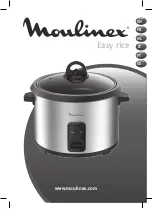
To Clean Inner Pot and Accessories
1. Remove the inner cooking pot. Wash it in warm, soapy water using a
nylon sponge or dishcloth. Do not use abrasive cleaners or scouring
pads, as they may damage the finish or create a risk of electric shock.
2. If rice is stuck to the bottom of the inner pot, soak in warm, soapy water
before scrubbing to avoid damage to the nonstick coating.
3. Rinse and dry thoroughly.
4. Repeat process with steam tray and other provided accessories.
To Clean Rice Cooker Exterior
1. Wipe the body of the rice cooker clean with a warm, damp cloth.
2. Dry with a soft cloth.
To Clean the Underside of the Lid
The underside of the lid should be cleaned after every use.
1. Wipe the underside of the lid with a warm, damp cloth.
2. Dry with a soft cloth.
To Clean the Condensation Collector
The condensation collector collects excess moisture from the lid to prevent it
from dripping into the rice or spilling. The condensation collector should be
cleaned after every use.
1. Remove the condensation collector by pushing in the space indicated
by the “Push” arrow.
2. Empty and wash in warm, soapy water. Dry with a a soft cloth.
3. Reattach the condensation collector to the rice cooker by snapping it
back into place.
To Clean Steam Vent
The steam vent should be cleaned after every use.
1. Pull out the steam vent as shown in
Diagram 1 (to the right).
2. Empty and wash the steam vent in warm,
soapy water. Rinse thoroughly.
3. Dry the steam vent with a soft cloth.
4. Reinsert the steam vent for next use.
HOW TO CLEAN
Always unplug unit and allow to cool completely before cleaning.
IMPORTANT
• Do not use harsh or abrasive cleaners.
• This appliance and the inner pot are NOT dishwasher safe.
14
BEFORE FIRST USE
1. Read all instructions and important safeguards.
2. Remove all packaging materials and make sure items are received
in good condition.
3. Tear up all plastic bags, as they can pose a risk to children.
4. Wash accessories in warm, soapy water. Rinse and dry thoroughly.
5. Remove inner pot from rice cooker and clean with warm,
soapy water. Rinse and dry thoroughly before returning to cooker.
6. Wipe body clean with a damp cloth.
• Do not use abrasive cleaners or scouring pads.
• Do not immerse the rice cooker base, cord or plug in water
at any time.
COOKING RICE
1. Using the measuring cup provided, measure out the desired amount of
rice. One cup refers to one full, level cup.
The measuring cup provided
adheres to rice industry standards (180mL or ¾ of a standard U.S. cup) and
is not equal to one U.S. cup (240mL).
2. Rinse rice in a mesh strainer or other separate container (do not rinse rice
in the inner pot) until the water becomes relatively clear. Place rinsed
rice into the inner pot.
3.
Using the measuring cup provided or the measurement lines inside the
inner pot
, add the appropriate amount of water to the inner pot. A
helpful “
Rice/Water Measurement Chart
” is on the next page (
page 6
)
for reference. Smooth over the top of the rice with the rice paddle so
that rice surface is level to ensure even cooking.
TIP:
To add an extra dimension of flavor to rice, try substituting a favorite
variety of meat or vegetable broth or stock. The ratio of broth/stock
to rice will be the same as water to rice.
CONTINUED ON NEXT PAGE
5
SHORT ON TIME?
Use the “Quick Rice” function. See more details on this time-saving
feature on
page 8
.
Diagram 1




























